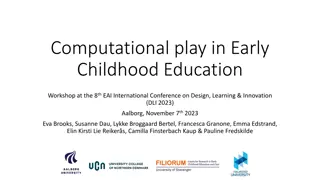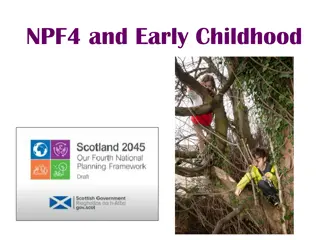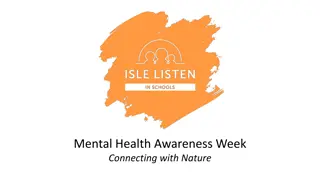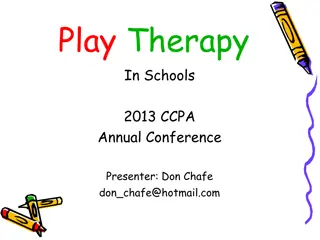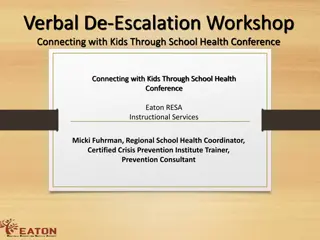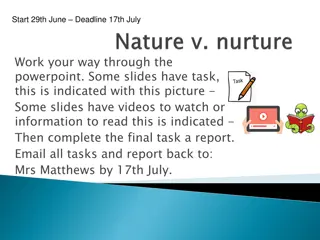Understanding Children's Play Development: Connecting Nature and Environment
Outdoor play connects children, both typical and atypical, to nature and their surroundings, fostering cognitive skills and imaginative play. Piaget and Vygotsky emphasized the importance of symbolic thought in play, leading to language development and diversification of skills like expression, independence, and divergent thinking. Different stages of play development, including unoccupied behavior, onlooker play, solitary play, parallel play, associative play, and cooperative play, provide valuable insights into children's social and cognitive growth.
Download Presentation

Please find below an Image/Link to download the presentation.
The content on the website is provided AS IS for your information and personal use only. It may not be sold, licensed, or shared on other websites without obtaining consent from the author. Download presentation by click this link. If you encounter any issues during the download, it is possible that the publisher has removed the file from their server.
E N D
Presentation Transcript
Physical development Outdoor play connects typical and atypical children to nature and their environment Cognitive skills Piaget & Vygotsky believed that imaginative play is one of the purest form of symbolic thought Language development Dramatic play Games with rules
Expression of feelings Independence Divergent thinking
Functional Play (0-2) the child engages in repetitive activities Constructive Play (2-4) learning to use simple materials to satisfy a purpose Dramatic Play (4-7) assigning roles and taking upon the roles Games with Rules (7-11) understanding rules and learn how to cooperate
1. Unoccupied behavior during infancy, a child occupies himself by watching anything of momentary interest http://child-care-preschool.brighthorizons.com/~/media/bh/centers/0352/galleries/theworldofinfants-photo-3122014120000am/6353024330202032031013466jpg635302433022853469.ashx?bc=whitemw=438thn=0
2. Onlooker play young toddlers focus on the activity rather than the environment
3. Solitary play (toddlers) the child plays alone without the regard to what other children are doing
4. Parallel play (ages 2-3) a child sitting next to another child, playing with the same toys, but in a different way. It is the early stage of peer interaction, but the focus is on the object rather than another child
5. Associative play (ages 3-4)- a child goes in and out of the play with other children, uses same toys and participates in the same activity, but in his own way
6. Cooperative play (ages 4 and up) group play that involves organized ideas, assigned roles, taking turns, making friends, organizing games and activities
Teacher-Directed Play Child-Initiated Play with teacher support Teacher intervention in play Practical ways to stimulate and extend play Ask questions Make suggestions Provide plenty of time for play Use language to Enrich play Make a special point of including children who have disabilities
Move with the childs play sense what will enhance the play and offer suggestions Put yourself in the position of the child Put children in command of play
A rich background of actual life experience is fundamental to developing creative play fieldtrips, experiences with many ethnic groups, books and visitors will enrich their imagination Offer many opportunities for outdoor play Equipment plays an important role in facilitating play include open-ended materials that can be used in a variety ways (boards, blocks, ladders) Rotate the materials frequently and rearrange them in a appealing and complex ways Store materials in convenient, easy-to-reach places
Creative dramatic play add variations Importance of Block play: Emergent perceptual-motor skills stacking, reaching, grasping, lifting, carrying, balancing Emotionally satisfying block play help children feel strong and masterful and creative Visual-spatial relationships Cognitive development
Water play Mud and sand Computer and digital screen play




